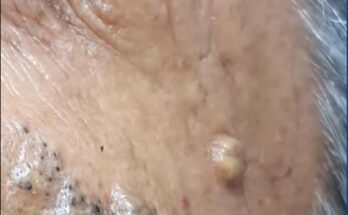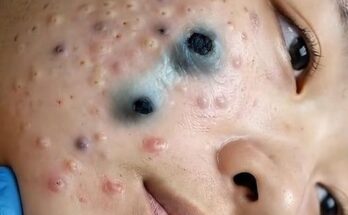Acne is something most people experience at some point, and it can show up at the least convenient times.
Whether you are getting ready for an important meeting, a school event, or just want to feel more confident, you might wish to minimize the appearance of acne — but not everyone wants to use makeup to do it.
The good news is that there are several gentle and practical ways to reduce the visibility of blemishes without reaching for concealer or foundation.
With a few simple habits and natural tricks, you can help your skin look calmer and more balanced while feeling comfortable in your own skin.
Start with Clean, Balanced Skin
One of the most effective ways to make acne less noticeable is by keeping your skin clean and hydrated. It’s best to wash your face twice a day using a mild cleanser that suits your skin type. Harsh scrubbing or over-cleansing can irritate your skin and make blemishes stand out more. After cleansing, pat your skin dry gently with a clean towel instead of rubbing it. Follow up with a lightweight moisturizer to maintain your skin’s natural balance. Hydration helps prevent dryness and flakiness, which can draw attention to uneven areas. Choose a non-comedogenic moisturizer, meaning it won’t clog pores, and look for one with soothing ingredients like aloe vera or green tea extract.

Use a Cool Compress to Calm Redness
If you have a breakout that looks red or swollen, a quick way to reduce its appearance is to apply a cool compress. Wrap a few ice cubes in a clean cloth or use a cold spoon from the refrigerator and gently press it against the affected area for a minute or two. The cold helps constrict blood vessels, which can make the skin look calmer and less inflamed. You can repeat this a few times a day, especially before going out, to help your complexion appear smoother.
Try Gentle Natural Remedies
Some natural ingredients can help soothe the skin and temporarily make acne less noticeable. A dab of pure aloe vera gel, for instance, can provide a cooling and calming effect. Green tea extract or chamomile tea that has cooled down can also be applied to the skin using a cotton pad to help reduce visible redness. These methods are mild and can be used as part of your regular skincare routine. Another popular option is honey. Known for its natural soothing properties, a thin layer of honey on problem areas for about 10 to 15 minutes before rinsing can help your skin feel softer and look more even-toned. Always make sure to patch-test any remedy first to ensure it agrees with your skin.
Focus on a Healthy Skincare Routine
Consistency is key when it comes to improving your skin’s overall appearance. Create a simple daily routine that keeps your skin clear and refreshed. Include gentle exfoliation once or twice a week to remove dead skin cells that can make pores appear larger or uneven. Avoid scrubs with rough particles that can irritate acne-prone skin — instead, use mild exfoliating acids like lactic or mandelic acid if your skin tolerates them. It’s also important to avoid touching your face throughout the day. Our hands come into contact with many surfaces, and touching your skin can transfer oils and bacteria that may contribute to breakouts. Keeping your pillowcases and towels clean also helps maintain a clearer surface for your skin.
Manage Shine and Oil Naturally
If excess oil makes your acne more visible, there are ways to manage it without makeup. Blotting papers are an excellent tool to gently absorb oil without removing moisture or irritating the skin. You can also carry soft tissues if you don’t have blotting papers on hand. When choosing skincare products, opt for those labeled “oil-free” or “matte finish” to help control shine. Lightweight gels or water-based moisturizers can provide hydration while reducing the greasy look that sometimes makes blemishes stand out. Using a gentle clay mask once or twice a week can also help balance oil production and leave your skin looking smoother.
Consider Your Hair and Clothing Choices
Believe it or not, your hairstyle and clothing can subtly help draw attention away from acne. If you have blemishes on your forehead, you might try styling your hair so it doesn’t rest directly on your skin, as natural oils from hair can sometimes contribute to clogged pores. If you have acne on your cheeks or jawline, keeping your hair clean and pulled back can make a difference. Wearing colors that complement your skin tone can also make your complexion appear brighter and more even. Light, breathable fabrics like cotton allow your skin to stay cool and less prone to irritation. If you’re spending time outdoors, wearing a wide-brimmed hat or staying in the shade can also help protect your skin from sun exposure, which sometimes makes blemishes more noticeable.
Use the Power of Good Lighting
Lighting can have a big impact on how acne looks in photos or mirrors. Harsh lighting often exaggerates shadows and texture. Soft, natural lighting is the most flattering, as it diffuses evenly across your face and minimizes contrast. If you need to take a picture or attend a video call, try facing a window with indirect light or using a lamp with a warm, diffused glow to create a smooth, natural look.
Support Your Skin from Within
Your skin’s appearance is influenced by many factors, including hydration, rest, and nutrition. Drinking enough water throughout the day helps your skin stay supple and healthy-looking. Getting enough sleep gives your body time to repair and renew itself, which often results in a fresher complexion. Eating a variety of fruits, vegetables, and whole foods can support your skin’s natural balance. Foods rich in antioxidants, such as berries and leafy greens, can help your skin appear brighter. Limiting sugary or processed foods might also help some people notice a difference over time.
Confidence Is the Best Glow
While it’s natural to want to hide acne, remember that clear skin doesn’t define beauty or confidence. Many people experience breakouts, and it’s a normal part of life. Focusing on gentle care and self-acceptance can make an even bigger difference in how you feel and how others perceive you. When you take good care of your skin and treat it kindly, you project confidence that shines more brightly than any blemish ever could. Try to smile often, maintain good posture, and engage in activities that make you happy — those are the most powerful ways to shift attention away from any imperfections.
Final Thoughts
Hiding acne without makeup isn’t about covering who you are; it’s about feeling comfortable and confident in your own skin. Simple changes in skincare, lifestyle, and habits can help your complexion look calmer and more balanced. By focusing on gentle routines, natural remedies, and positive self-care, you can reduce the visibility of blemishes while nurturing your skin’s long-term health. With patience and consistency, you may find that your skin begins to look better naturally — and even on days when acne shows up, you’ll know how to keep it in check while embracing the beauty that’s uniquely yours.


